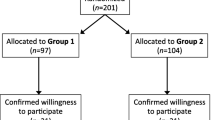Abstract
This paper describes the experience of a group of undergraduate students’ (n = 40) experience learning mindfulness meditation. The practice of mindfulness meditation can help individuals to self-calm, focus on the present moment, and experience physical and mental health benefits. This skill is of particular importance to undergraduate students, who often experience stress, anxiety, or depression. Participants were led by the author in a 15-min face-to-face exercise in which they focused attention on specific body parts in a progressive fashion. Participants were also provided a digital (mp3/podcast) version of the session so that they could listen to it at their convenience and learn to perform the technique on their own. About a quarter of the student participants preferred the digital practice, citing its privacy and ability to repeat the practice as benefits. Well over half of the students preferred the face-to-face session, citing the value of having a leader and colleagues; this preference provides support for the notion of the sangha, or community, in spiritual practice. The study outlines the benefits and challenges of face-to-face and digital meditation practice and emphasizes the importance of learning the practice via both delivery methods.
Similar content being viewed by others

References
Austin, J. E., Saklofske, H. D., & Mastoras, M. S. (2010). Emotional intelligence, coping and exam-related stress in Canadian undergraduate students. Australian Journal of Psychology, 62(1), 42–50. doi:10.1080/00049530903312899.
Barnes, V. A., Bauza, L. B., & Treiber, F. A. (2003). Impact of stress reduction on negative school behaviour in adolescents. Health and Quality of Life Outcomes, 1(10). Retrieved September 8, 2009 from http://www.hqlo.com/content/1/1/10
Barton, A. (2011). Wrap your mind around this: Meditation changes the brain. The Globe and Mail, p. L1.
Bradshaw, J. & Wingrove, J. (2012). As student stress hits crisis levels, universities look to ease pressure. The Globe and Mail. Retrieved from http://www.theglobeandmail.com/news/national/as-student-stress-hits-crisis-levels-universities-look-to-ease-pressure/article5902668/
Cardaciotto, L., Herbet, J. D., Forman, E. M., Moitra, E., & Farow, V. (2008). The assessment of present-moment awareness and acceptance: The Philadelphia Mindfulness Scale. Assessment, 15, 204–223.
Carmody, J., Reed, G., Kristeller, J., & Merriam, P. (2008). Mindfulness, spirituality, and health related symptoms. Journal of Psychosomatic Research, 64, 393–403.
Charmaz, K. (2006). Constructing grounded theory. London: Sage.
Chiesa, A., & Settetti, A. (2009). Mindfulness-based stress reduction for stress management in healthy people: a review and meta-analysis. Journal of Alternative and Complementary Medicine, 15(5), 593–600. doi:10.1089/acm.2008.0495.
Darling, C. A., McWey, L. M., Howard, S. N., & Olmstead, S. B. (2007). College student stress: the influence of interpersonal relationships on sense of coherence. Stress & Health: Journal of the International Society for the Investigation of Stress, 23(4), 215–229.
Dyson, R., & Renk, K. (2006). Freshmen adaptation to university life: depressive symptoms, stress, and coping. Journal of Clinical Psychology, 62(10), 1231–1244. doi:10.1002/jclp.20295.
Gardner-Nix, J. (2009). Mindfulness-based stress reduction for chronic pain management. In F. Didonna (Ed.), Clinical handbook of mindfulness (pp. 369–382). New York: Springer.
Hölzel, B. K., Carmody, J., Vangel, M., Congleton, C., Yerramsetti, S. M., Gard, T., et al. (2011). Mindfulness practice leads to increases in regional brain gray matter density. Psychiatry Research: Neuroimaging, 191, 36–42.
Hyland, T. (2009). Mindfulness and the therapeutic function of education. Journal of Philosophy of Education, 43(1), 119–131.
Hyland, T. (2011). Mindfulness and learning. New York: Springer.
Jacobson, E. (1929). Progressive relaxation. Oxford: University of Chicago Press.
Jain, S., Shapiro, S. L., Swanick, S., Roesch, S. C., Mills, P. M., Bell, I., et al. (2007). A randomized controlled trial of mindfulness meditation versus relaxation training: effects on distress, positive states of mind, rumination and distraction. Annals of Behavioral Medicine, 33, 11–21.
Janowiak, J., & Hackman, R. (1994). Meditation and college students’ self-actualization and rated stress. Psychological Reports, 75, 1007–1010.
Kabat-Zinn, J. (1990). Full catastrophe living: using the wisdom of your body and mind to face stress, pain and illness. New York: Delta.
Lindberg, D. A. (2005). Integrative review of research related to meditation, spirituality, and the elderly. Geriatric Nursing, 26, 372–377.
Ludwig, D. S., & Kabat-Zinn, J. (2008). Mindfulness in medicine. Journal of the American Medical Association, 300, 1350–1352.
Nonis, A. S., Hudson, I. G., Logan, B. L., & Ford, W. C. (1998). Influence of perceived control over time on college students’ stress and stress-related outcomes. Research in Higher Education, 39(5), 587–605.
Robotham, D. (2008). Stress among higher education students: towards a research agenda. Higher Education, 56, 735–746. doi:10.1007/s10734-008-9137-1.
Rockefeller, C. S. (1994). Meditation, social change, and undergraduate education. The Contemplative Mind in Society, 1–11.
Rosenthal, R., & Fode, K. R. (1963). Psychology of the scientist: three experiments in experimenter bias. Psychological Reports, 12, 491–511.
Segal, Z. V., Williams, M. G., & Teasdale, J. D. (2002). Mindfulness-based cognitive therapy for depression: a new approach to preventing relapse. New York: Guilford.
Smith, K. R. (2012). College students’ perceptions of aptitude and attitude toward social media technology and technical computer technology. International Journal of Business, Humanities and Technology, 2(5). Retrieved from http://www.ijbhtnet.com/journals/Vol_2_No_5_August_2012/3.pdf
Smith, S. D., Salaway, G., & Borrenson Caruso, J. (2009). The ECAR study of undergraduate students and information technology, 200. EDUCAUSE Center for Applied Research.
Tloczynski, J., & Tantriella, M. (1998). A comparison of the effects of Zen breath meditation or relaxation on college adjustment. Psychologia, 41, 32–43.
Travis, F., Haaga, D. A., Hagelin, J., Tanner, M., Nidich, S., Gaylord-King, C., et al. (2009). Effects of transcendental meditation practice on brain functioning and stress reactivity in college students. International Journal of Psychophysiology, 71, 170–176. doi:10.1016/j.ijpsycho.2008.09.007.
Winbush, N. Y., Gross, C. R., & Kreitzer, M. J. (2007). The effects of mindfulness-based stress reduction on sleep disturbance: a systematic review. Explore (NY), 3, 585–591.
Author information
Authors and Affiliations
Corresponding author
Rights and permissions
About this article
Cite this article
Lauricella, S. Mindfulness Meditation with Undergraduates in Face-to-Face and Digital Practice: a Formative Analysis. Mindfulness 5, 682–688 (2014). https://doi.org/10.1007/s12671-013-0222-x
Published:
Issue Date:
DOI: https://doi.org/10.1007/s12671-013-0222-x



